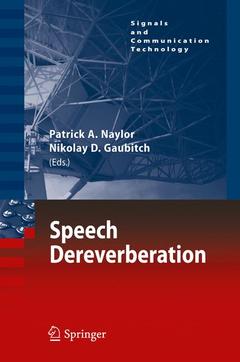Description
Speech Dereverberation, 2010
Signals and Communication Technology Series
Language: English
Subjects for Speech Dereverberation:
Publication date: 09-2012
388 p. · 15.5x23.5 cm · Paperback
Publication date: 07-2010
388 p. · 15.5x23.5 cm · Hardback
Description
/li>Contents
/li>Biography
/li>Comment
/li>
Speech Dereverberation gathers together an overview, a mathematical formulation of the problem and the state-of-the-art solutions for dereverberation.
Speech Dereverberation presents current approaches to the problem of reverberation. It provides a review of topics in room acoustics and also describes performance measures for dereverberation. The algorithms are then explained with mathematical analysis and examples that enable the reader to see the strengths and weaknesses of the various techniques, as well as giving an understanding of the questions still to be addressed. Techniques rooted in speech enhancement are included, in addition to a treatment of multichannel blind acoustic system identification and inversion. The TRINICON framework is shown in the context of dereverberation to be a generalization of the signal processing for a range of analysis and enhancement techniques.
Speech Dereverberation is suitable for students at masters and doctoral level, as well as established researchers.
Patrick A. Naylor has a PhD in Speech Signal Processing from Imperial College London, where he is currently Reader and Director of Postgraduate Studies for the Department of Electrical and Electronic Engineering. His research interests include speech and audio signal processing; adaptive signal processing; speech enhancement in telecommunications; hands-free functionality; blind SIMO/MIMO channel estimation and dereverberation; speaker identification and verification; and speech production modelling. He is on the IEEE Technical Committee on Audio and Electroacoustics and is Associate Editor of the IEEE Transactions on Audio Speech and Language Processing.
Nikolay D. Gaubitch has a PhD in Acoustic Signal Processing from Imperial College London, where he is now Research Associate. In 2001 and 2002 he was awarded the Drapers' Company Undergraduate Prize for outstanding academic achievement. His research interests span various topics in single and multichannel speech and audio processing including dereverberation, blind system identification, acoustic system equalization and speech enhancement. He is a member of the IEEE.




